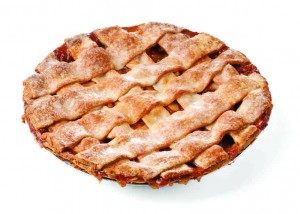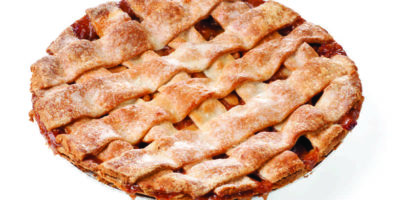Lilith Feature
Blackberries
 A year before my mother dropped us off with our father in New Jersey so she could follow her heart and go to India, she took custody of my younger sister and me. We were just back from living on a kibbutz in Be’er Sheva, and had no family to speak of out in Seattle, so she dragged us wherever she needed to, whether it was appropriate for a six-year-old and a four-year-old or not. We went to meditation groups for a famous Indian guru she was devotedly following, to places where she chanted all day, to all kinds of different people’s houses. I never wanted to go to these places but my mom got me to cooperate with promises of fun and food. And then later, when fun was getting hard to believe, it was the food that drove me; it was the one thing I could look forward to.
A year before my mother dropped us off with our father in New Jersey so she could follow her heart and go to India, she took custody of my younger sister and me. We were just back from living on a kibbutz in Be’er Sheva, and had no family to speak of out in Seattle, so she dragged us wherever she needed to, whether it was appropriate for a six-year-old and a four-year-old or not. We went to meditation groups for a famous Indian guru she was devotedly following, to places where she chanted all day, to all kinds of different people’s houses. I never wanted to go to these places but my mom got me to cooperate with promises of fun and food. And then later, when fun was getting hard to believe, it was the food that drove me; it was the one thing I could look forward to.
All it took was the pledge of a treat and I climbed into our old wood-paneled station wagon. When her guru group held a party one Sunday afternoon, I cashed in as soon as we arrived and took my cookie outside to eat. The adults were lying around the grass with languid smiles, massaging each other. Their eyes stopped just short of focusing somehow, I couldn’t tell if they were actually seeing anything they looked at. There were no other children around so I sat near one of my mom’s friends, one I knew, and ate my cookie. After a while she gave my foot a little massage, so I gave her a foot rub back. She told me I had strong hands, and especially strong thumbs so I kept massaging, as powerfully as I could. I felt useful. Which is not the same as important, but it was good to have a place.
That same summer, my mom took us to another friend’s house with the promise of blackberry pie. Her friend lived near the water in a house by herself, she didn’t have any kids and she was thin, kind of pinched. When she met me and my sister no light sparked in her eyes and for the rest of the day she made no effort at connection. It was as if we were just unavoidable features of my mother’s life.
Shortly after we arrived, the woman announced we were going blackberry picking for the pie. This was bad news on the one hand; the pie was not even nearly ready. But picking as much food off a bush as I could eat sounded all right.
The berries grew on the bank along the water and some of the bushes were best reached by wading in the chilly lake. This was not my favorite part, I didn’t like being cold and I hated the spider webs that had woven together some of the brambles, making it even harder to pick berries among the thorns. Spiders on berries seemed unfair. My mother picked berries up ahead with her friend; my sister and I trailed behind, like afterthoughts.
When we were finished picking, we went back to the house and my sister and I watched the woman make the crust. We stood in the kitchen, still as we could, as she tumbled the berries into the pie shell, cut the remaining dough into strips, and crossed them over the top. She put the pie in the oven and soon there was the smell of warm doughy fruit. In that stiff quiet house my stomach growled and curled in on itself but I stayed quiet. I knew not to ask for anything.
At last the pie came out. The deep purple juice shined and bubbled. Soft, shapeless pieces of berry poked out between the criss-cross crust. I moved closer as the woman placed it gently beside four plates and a knife. But she didn’t cut up slices. She sat back down with my mother as if the pie we’d all worked hard for wasn’t out and ready.
My stomach twisted. I couldn’t take it anymore. I looked at my sister for courage. She looked back at me, her green eyes wide with waiting. From beneath her mop of knotted curly hair, she arched her eyebrows and pursed her lips, but remained silent. It would be up to me. I turned back to the adults who were sitting at the kitchen table and said excuse me, can we have the pie now? My mom’s friend finished her sentence before she looked over. You have to wait until it’s cool, she answered, and then she went on talking to my mom. My mother said nothing.
Finally the woman cut the pie and my mother handed me a slice. I’d never eaten homemade pie before; every baked good I knew came from a package. I took a taste of the gooey dark insides but the pie burned my mouth before I could taste any of its sweetness. I kept eating anyway. I ate the whole slice, searching with each bite for the payoff, a sugary rush, a burst of fresh fruit, the richness of butter. But there was nothing so satisfying about it. In fact, I didn’t like that pie at all.
I used to think it was because I didn’t like that woman. I thought it was her fault my mom wasn’t really with us that day. But she wasn’t the one who took my mom away from me. And it wasn’t the Indian guru’s fault either, or the people my mom met at all his parties. Being with my mom could not ever be what me and my sister hoped for because although she was there, she couldn’t really see us. Even before she left, part of her was already gone.
Ronit Feinglass Plank’s writing has appeared in Niche Magazine, Switchback, and Red Fez. She won Switchback’s May 2012 flash fiction contest and has also written and performed her own work for the theatre. Just nominated for a Pushcart prize, Plank lives in Seattle.


